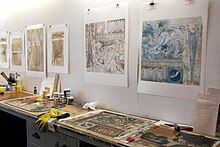
Collagraphy (sometimes spelled collography) is a printmaking process in which materials are glued or sealed to a rigid substrate (such as paperboard or wood) to create a plate. Once inked, the plate becomes a tool for imprinting the design onto paper or another medium. The resulting print is termed a collagraph. The term "collagraph" was coined by Glen Alps in the 1950s, and is derived from the Greek word koll or kolla, meaning glue, and graph, meaning the activity of drawing.

Artists use a variety of materials in collagraphy, including yarn, fabric, tape, different varieties of cut paper or card, leaves, and acrylic mediums. The application of ink onto the collagraph plate is versatile, consisting of intaglio-inking into recesses, brayer or paintbrush inking onto relief surfaces, or a combination of these methods. A print can be made with or without use of a press.
See also
References
- Zeng, Natasha (2015-12-17). "Experiments in Truth: Collagraph Printmaking, Environmental Stewardship, School Psychology, Social Change, and Virtues & Vices". Wheaton Magazine. Retrieved 2023-12-05.
- ^ MacKenzie, Susie (2019). Making Collagraph Prints. Crowood Press. ISBN 9781785005824. OCLC 1112656269.
- "Collagraph Printmaking [Lesson Plan]" (PDF). Dick Blick. 2008.
- Oldfield, Vicky (2023). Mixed-Media Collagraph Prints: Creative Techniques. Crowood Press. ISBN 9780719841071. OCLC 1391439355.
Further reading
- Brenda Hartill; Richard Clarke (2005). Collagraphs and Mixed-Media Printmaking.
- Robert Adam; Carol Robertson (2008). Intaglio: Acrylic-Resist Etching, Collagraphy, Engraving, Drypoint, Mezzotint.
- Mary Ann Wenniger (1981). Collagraph Printmaking.
- Clare Romano; John Ross (1980). The Complete Collagraph: The Art and Technique of Printmaking from Collage Plates.
- Donald Stoltenberg (1975). Collagraph Printmaking.
This printmaking-related article is a stub. You can help Misplaced Pages by expanding it. |